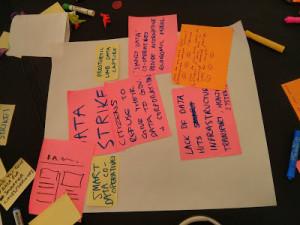What happens to a smart city when there’s no access to personal data?

Last week I had the pleasure of attending the Digital Revolutions Oxford summer school, a gathering of PhD’s doing research into the ‘digital economy’. On the second day, we were asked to form teams and engage in some wild speculation. Our task was to imagine a news headline in 2033, covering some significant event that relates to the research we are currently undertaking. My group took this as an opportunity to explore various utopian / dystopian themes relating to power struggles over personal data, smart cities and prosthetic limbs.
The headline we came up with was ‘Data Strike: Citizens refuse to give their data to Governments and Corporations’. Our hypothesis was that as ‘smart cities’ materialise, essential pieces of infrastructure will become increasingly dependent on the personal data of the city’s inhabitants. For instance, the provision of goods and services will be carefully calibrated to respond and adjust to the circumstances of individual consumers. Management of traffic flow and transportation systems will depend on uninterrupted access to every individual’s location data. Distributed public health systems will feed back data live from our immune systems to the health authorities.
In a smart city, personal data itself is as critical a piece of infrastructure as you can get. And as any observer of strike action will know, critical infrastructure can quickly be brought to a halt if the people it depends on decide not to co-operate. What would happen in a smart city if its inhabitants decided to go on a data strike? We imagined a city-wide personal data blackout, where individuals turn off or deliberately scramble their personal devices, wreaking havoc on the city’s systems. Supply chains would misfire as targeted consumers dissappear from view. Public health monitoring signals would be scrambled. Self-driving cars would no longer know when to pick up and drop off passengers – or when to stop for pedestrians.
We ventured out into the streets of Oxford to see what ‘the public’ thought about our sensational predictions, and whether they would join the strike. I had trouble selling the idea of a ‘data co-operative’ to sceptical passengers waiting at the train station, but was surprised by the general level of concern and awareness about the use of personal data. As a break from dry academic work, this exercise in science fiction was a bit of light relief. But I think we touched on a serious point. Smart cities need information infrastructure, but ensuring good governance of this infrastructure will be paramount. Otherwise we may sleepwalk into a smart future where convenience and efficiency are promoted at the expense of privacy, autonomy and equality. We had better embed these values into smart infrastructure now, while the idea of a data strike still sounds ridiculous.
Thanks to Research Council’s UK Digital Economy Theme, Know Innovation and the Oxford CDT in healthcare innovation, for funding / organising / hosting the event. More comprehensive coverage can be found over on Chris Phethean’s write-up.